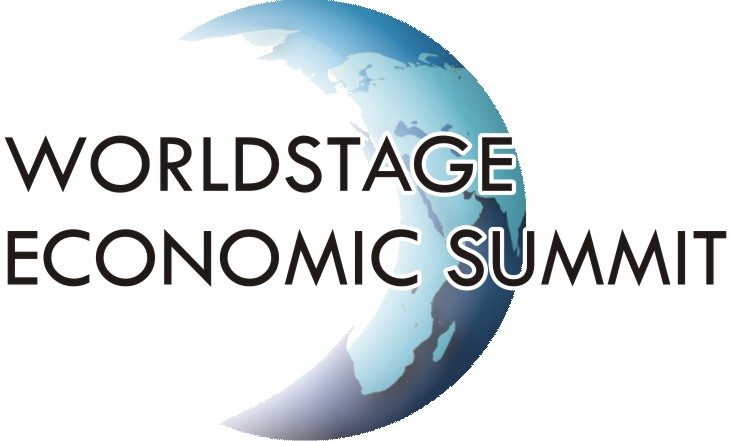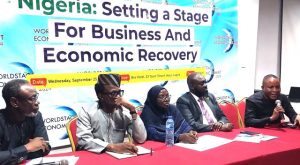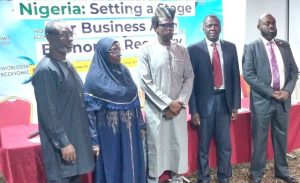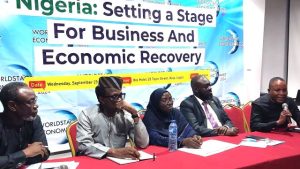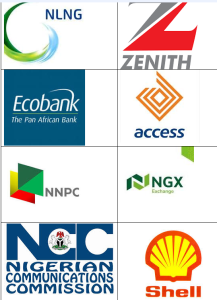WES 2024 charts ways for business and economy recovery in Nigeria

L-R: Mr. Mayowa Oludare, Editor in Chief, Global Financial Digest (Moderator); Mr. Tunde Kamali, Director, Office of of the Director General, representing Dr. Emomotimi Agama, Director General, Security and Exchange Commission (SEC); Prof. Yaqub Jameelah Omolara, Head of Department of Economics, Lagos State University (LASU); Prof. Diran Akinleye, Head of Department of Economics, University of Lagos (UNILAG); and Mr Tunji Jimoh, Zonal Controller, Lagos, representing Dr. Aminu Maida, Executive Vice Chairman, Nigerian Communications Commission (NCC) during the panel discussion at the WorldStage Economic Summit (WES) 2014 at Ibis Hotel, Lagos on Wednesday, September 25, 2024.
Speakers at the WorldStage Economic Summit (WES) 2014 were unanimous on the important role of government and the private sector to catalyze the process of reversing bad economic conditions of the Africa’s biggest economy.
The Summit in Lagos on Wednesday, September 25, 2024 with the theme: ‘Nigeria: Setting a Stage For Business And Economic Recovery’ attracted top executives and economic experts, including Prof. Diran Akinleye, Head of Department of Economics, University of Lagos and Professor Yaqub Jameelah Omolara, Head of Department of Economics, Lagos State University; Dr. Aminu Maida, Executive Vice Chairman, Nigerian Communications Commission (NCC); Dr. Emomotimi Agama, Director General, Security and Exchange Commission (SEC); and Khalil Suleiman Halilu, Executive Vice Chairman/Chief Executive, National Agency for Science and Engineering Infrastructure (NASENI).
In his contribution during the panel discussion, Prof. Akinleye asserted that the country was crying out for structural reform, given the degradation of national values.
According to him, the Nigerian economy is in transition with subsidies and grants being at the heart of most key sectors with the decoupling of government grants from these sectors responsible for pain experienced by the citizenry
He believed that the absence of clarity on the road map being followed and the absence of transparency and co-sacrifice by the political class should be cause for concern while conversations needed to be held on the end point of ongoing reforms and full disclosure on the destination of government savings on subsidy discontinuation.
He said it was common for government to demand that citizens should sacrifice for the success of reforms while it is believed that it engaged in wasteful expenditures.
He described this as a missed message best summarized as ‘do as I say and not necessarily do as I do,’
He also expressed misgivings about the current challenges of high inflation and foreign exchange problem, advising government to review some of its policies.
On the country’s budget system, the professor said one thing is for a budget to be prepared, another thing is for it to be implemented, saying a lot of influences from government and private sector always throw up implementation challenges.
He identified the challenges of the budget passing through political process, which would tamper with many things in the prepared budget. At the end he said it would not be about the economy, but about human nature.
To Prof. Yaqub Omolara, inconsistent policies which she described as double-edged sword are the bane of economic/social prosperity and progress in the country.
She decried the situation where successful governments discarded policies of their predecessors, not minding their necessities due to politics.
She also queried if policy makers or government leaders could make necessary sacrifices to harness the potentials of their development policies.
Prof. Yaqub also faulted the general impression that sees huge population as a liability, arguing that big population should be seen as a market.
She observed that the gap between national goals and the communications by the leaders to the led always lead to government not having the buy-in of the people in its programmes.
Besides, she said government activities were rigged with so much nebulous tendencies that make it difficult for people to believe their leaders.
She also spoke about the short coming of fiscal and monetary policies while canvassing for harmonization to address economic challenges.
On the performance of the current leadership of the Central Bank of Nigeria (CBN), she scored it 50%, saying the apex bank seems to be cautious about its steps as economic policies sometimes contradicted themselves.
Represented by Ibrahim Dauda, Coordinating Director F&A of NASENI, Halilu in a presentation titled “Fast-Tracking Industrialization Through Science and Engineering Infrastructure” said collaborative efforts between the government, private sector, and research institutions are essential for driving technological advancements while PPPs can leverage resources, expertise, and funding to accelerate innovation and industrial growth.
He said, “Developing local industries can create jobs, reduce imports, and boost the economy. Investing in local manufacturing capabilities strengthens the domestic industrial base and reduces reliance on foreign goods.”
As for Green Technologies, he said adopting sustainable technologies was crucial for long-term industrial growth as green technologies minimize environmental impact, promote resource efficiency, and contribute to a more sustainable future.
Moreover, Halilu said, digital transformation entails harnessing the power of artificial intelligence (AI), the Internet of Things (IoT), and automation in industries to enhance efficiency, productivity, and competitiveness. Digital transformation is essential for staying ahead in the global marketplace.
The Securities and Exchange Commission (SEC) boss, Dr. Emomotimi Agama on part said the commission was working to streamline regulatory processes to facilitate capital raising for infrastructure projects while ensuring robust investor protection.
With a reference to World Bank estimation that Nigeria faces a significant infrastructure deficit of $3 trillion, Agama said bridging the infrastructure gap will require a coordinated effort between the public and private sectors.
Speaking on a Sub-Theme: Nigeria: Funding Economic Transformation Through The Nigerian Capital Market, Agama represented by Mr. Tunde Kamali, Director, Office of of the Director General, Agama said financing of critical infrastructure was a top priority for Nigeria’s economic recovery as the capital market offers an ideal mechanism for funding large-scale projects, as demonstrated by successful infrastructure bonds and public-private partnerships (PPPs).
“Through the activities of foreign investors, the market is increasingly becoming more efficient and the foreign capital inflows have been used to augment the country’s external reserve with attendant benefits on the exchange rate, all these are geared towards the development of the Nigerian economy,” he said.
The SEC boss noted that government patronage of the capital market can significantly benefit both the market and the broader economy.
“By issuing bonds or long-term securities, the government enhances market depth and liquidity, attracting institutional investors seeking stable returns,” Agama said.
“This establishes a benchmark for pricing private-sector debt, boosting investor confidence and making the capital market more predictable.
“Increased government involvement signals stability, encouraging foreign direct and portfolio investment while promoting innovation and improved regulatory frameworks. Over time, government participation can lower borrowing costs for both the public and private sectors, fostering economic growth by channelling funds into key infrastructure and development projects. This stimulates the broader economy, creating jobs and enhancing productivity, which in turn benefits the capital market.
“Additionally, government engagement in the capital market can encourage public-private partnerships, offering investment opportunities while mitigating risk. It also provides investors with avenues to diversify their portfolios, reducing risk and fostering more stable returns. Finally, by offering secure investment instruments, government participation deepens domestic savings, allowing citizens to earn returns on their savings while contributing to national development.
“The Nigerian capital market continues to serve as an important pillar for the stability of the financial system, acting as a crucial conduit for the flow of capital and the efficient allocation of resources. By enabling businesses to raise funds and offering investors diversified opportunities, the capital market supports economic growth and strengthens corporate governance.
“It is important to recognize the indispensable role that our capital market plays in fostering sustainable development. A well-functioning capital market is the bedrock for long-term capital formation, enabling critical investments in infrastructure, energy, agriculture, and technology—sectors essential to Nigeria’s economic transformation.
“The Nigerian capital market is more than just a platform for raising funds; it is a reflection of our nation’s economic health, a vehicle for wealth creation, and a barometer of investor confidence. It is through this market that we can channel investments into projects that will stimulate growth and development.
“From traditional equity markets and bonds to innovative instruments like green bonds and sukuk, the capital market offers diverse options for funding the sectors that will drive Nigeria’s future prosperity.
“The capital market has a critical role to play in economic growth and development of a country and the Nigerian capital market has not been left behind in performing this role.”
The EVC of NCC, Dr. Aminu Maida in a presentation titled, ‘NCC’s Vision to Impact Nigeria’s Economic Recovery’ said the National Broadband Plan (NNBP) 2020-2025 was at the heart of the commission’s strategy to help achieve economic recovery.
“Broadband is the bedrock of economic recovery, enabling innovation, and fostering economic activities across all sectors,” he said.
Represented by Mr Tunji Jimoh, Zonal Controller, Lagos, Maida said as the agency charged with implementing the plan, it “is committed to expanding broadband infrastructure and creating an enabling environment for both local and foreign investments in the telecommunications sector.”
The NCC boss described digital transformation as a catalyst for economic growth, not a choice, but a necessity for economic revival, saying, “To this end, the Commission has been committed to building a robust digital economy that will drive inclusive growth, create jobs, and enhance the competitiveness of Nigerian businesses on a global scale.
“The National Digital Economy Policy and Strategy (2020-2030) of the Federal Government outlines a clear roadmap to achieving these goals, prioritizing broadband penetration, digital literacy, and the development of a vibrant digital ecosystem .
“The Strategic Blueprint of the Honourable Minster of Communications, Innovation and Digital Economy also provides the needed thrust on this journey. The Blueprint is a detailed and progressive framework that encompasses five key pillars: Knowledge, Policy, Infrastructure, Innovation, Entrepreneurship & Capital, and Trade. Knowledge is the cornerstone upon which innovation thrives and is built upon the bedrock of sound policies. Infrastructure provides the essential backbone for a thriving digital economy, while innovation and entrepreneurship drive economic diversification. The trade pillar connotes our commitment to global collaboration and partnerships, recognising that innovation knows no borders.
“Drawing from this this blueprint, the Commission has outlined its Strategic Focus Areas, recognizing that each of its stakeholders – the Consumers, the Licensees and Industry, and the Government – holds a unique perspective and has distinct expectations from the Commission. The Commission’s strategic vision is therefore guided by the objective of meeting the specific expectations of each stakeholder group.
“In line with the Ministerial Strategic Vision Plan, the Commission is deepening the digital terrain by supporting digital economy initiatives of different organizations and institutions across the country. These interventions range from conferences, summits, regional tech gatherings, digital/tech-inclined training, and talent hunts to youth entrepreneurship and empowerment programmes. Deliberate efforts have been set to support and participate in timely knowledge sharing events on the digital economy, and workshops on emerging technologies while conducting series of studies on Incubation and Innovation Hubs, Digital Entrepreneurship, Technological Innovations, and Indigenous Content in the Telecommunications Sector amongst others.”
He described Public-Private Partnerships as a Pathway to Sustainable Growth, saying, “the fostering of partnerships that leverage the strengths of both sectors to expand digital infrastructure, promote digital literacy, and drive digital innovation.”
“The NCC is committed to bridging the digital divide between urban and rural areas, ensuring that every Nigerian has access to affordable and reliable internet services. Initiatives from USPF have been tailored towards the underserved and unserved communities of the country. These include Digital Literacy Programmes, Emerging Technology Centres, Tertiary Institution Centres, Computer Based Test Centres, Community ICT centres and satellite deployments. Other programmes include the Digital Learning Initiative, Digital Literacy for Teachers, Youth Entrepreneurship Programmes, Digital Skills for Youth Empowerment, Digital Awareness Programme, Digital Entrepreneurship Capacity Building, Techpreneurship Training etc. Through these targeted interventions and strategic partnerships, the Commission aims to enhance digital literacy, empower women and youth, and promote entrepreneurship across the country.”
He therefore offered NCC to be a catalyst for positive change, a driver of innovation, and a partner in progress, he invited stakeholders to join us in the journey to build a resilient economy, create opportunities for all Nigerians, and position Nigeria as a leader in the global digital economy.
In his welcome address, Mr Segun Adeleye, President/CEO, World Stage Limited said Nigeria, the Africa’s largest economy which naturally should be an epic centre advancement and prosperity is currently facing a number of economic challenges that are threaten growth prospects and stability.
“Challenges such as high inflation, foreign exchange rate volatility, low productivity which limits growth potential and competitiveness, poor power supply, fuel scarcity, poor infrastructure among others are biting harder with many wondering whether the current government actually has the clue on how to turn things around,” he said.
“As the case was last year during our summit, the economy has been struggling to recover from the impact of the COVID-19 pandemic, which caused a recession in 2020. But the approach of the new government through different stimuli to achieve sustainability has brought about great hardship with inflation hitting 33.40 per cent in July 2024 no thanks to excess liquidity, supply shocks, fuel price deregulation, exchange rate depreciation, insecurity, and border closures.
“Things have remained tough even with the Organised Private Sector lamenting that the consecutive monthly drop in the rate of inflation to 32.15 per cent in August contradicts the current economic realities across the country.”
He said President Bola Tinubu’s posture so far despite repeated labour and nationwide protests had convinced not a few that he will not reverse his policies on the fuel subsidy and free floating of the naira with strong conviction that they will pay off in the long run to make the economy strong.
“It’s worthy of note that Nigeria’s Gross Domestic Product (GDP) grew by 2.98% (year-on-year) in real terms in the first quarter of 2024, up from 2.31% recorded in the first quarter of 2023 and lower than the fourth quarter of 2023 growth of 3.46%, according to National Bureau of Statistics. The Presidential Policy Advisory Council has come up with a blueprint to propel the country into a $1 trillion economy within the next eight years and achieve an average annual GDP growth rate of 7% and GDP per capita of $3,631,” he said .
He quoted PwC’s Nigerian Economic Outlook 2024 to have listed seven trends that will shape the Nigerian economy in 2024 to include, Executing fiscal reforms- balancing ambition with budgetary implementation; Evolving monetary policy stance- finding the right framework and instruments to achieve price stability; Cautiously optimistic investors; Undulating pathways to unlocking productivity in the economy; Persisting vulnerability to external pressures with potential of ‘shocks’; Consumers may likely adjust better to the evolving policy and macro realities; and Improved sectoral development riding on reforms.
He said WES 2024 with the theme ‘Nigeria: Setting a Stage For Business And Economic Recovery’ was convinced that government and businesses have no choice than to align strategies for common good in economic recovery through stable power supply, job creation, exchange rate management, inflation control, banking recapitalization, fiscal and debt management, structural reforms, human capital development and economic diversification.
“Irrespective of diverse views that many may share about Nigeria, they always have a convergence of the belief that it has enormous potential and opportunities to overcome its challenges and achieve sustainable and inclusive growth,” he said.
“Many have been advocating economic diversification and structural transformation for government to reduce dependence on oil exports and diversify into other sectors, such as agriculture, manufacturing, and services. The government is also being advised to support the development of value chains and clusters, and enhance the linkages between the oil and non-oil sectors while also foster regional integration and trade and take advantage of the opportunities offered by the African Continental Free Trade Area (AfCFTA).
“As Nigeria’s productivity growth averaged 0.8% for 19 years between 2000 and 2019, compared to 2.5% for sub-Saharan Africa and 3.6% for the world, WorldStage Economic Summit is of the view that the low productivity which is linked to poor infrastructure, weak human capital, low innovation, and limited access to finance can be addressed with deliberate economic diversification.”
He said this informed the assembling of professionals from different sectors of the economy and experts from the ivory towers to stimulate case discussions, public buy-in and lasting solutions at the summit.
“In fact this could be the most critical period in the life of Nigeria’s economy when it either diversify and survive or slip into recession and return to the old ways of doing things through subsidy and over dependency on petroleum as the main source of foreign exchange,” he said.
“The coming on stream of the 650,000bpd Dangote Petroleum Refinery and Petrochemicals is significant and the owner along with the Federal Government want us to be optimistic that it’s a return to industrialisation and local refining.
“It’s no doubt a big deal and an important step towards energy self-sufficiency in Nigeria as the operator advances energy security which is fundamental of government’s policy of boosting domestic investment. The other significant benefit is the expected reduction of foreign exchange demand by at least 40 percent and generation of foreign earnings through exports.”
WES over the years has been consistent in addressing economic challenges through deliberation and recommendation of practicable solutions with public and private sector engagement in an innovation setting to inspire new thinking in business, policy formulation/implementation, economic reform and development.
